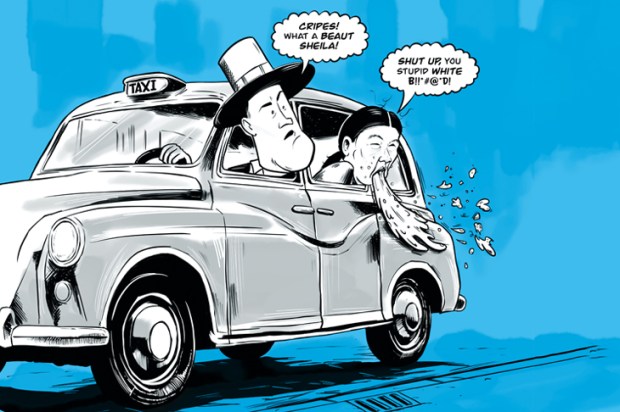‘My own forays into Wrongthink have made me the subject of constant bullying by colleagues who disagree with my views.’ No, it’s not a line out of some modern re-make of 1984 or Brave New World. It’s one of many deeply disturbing lines from the resignation letter of former New York Times opinions editor Bari Weiss to her boss, complaining of an intolerance of conservative views. Equally concerning is her observation of the unwritten rules that now appear to govern journalists who work for the majority of the mainstream media:
Rule One: Speak your mind at your own peril. Rule Two: Never risk commissioning a story that goes against the narrative. Rule Three: Never believe an editor or publisher who urges you to go against the grain. Eventually, the publisher will cave to the mob, the editor will get fired or reassigned, and you’ll be hung out to dry.
Spectator Australia readers (and writers) need have no fear that any such rules apply within these pages. Indeed, quite the opposite. Ms Weiss resigned from the NYT because she believes that her efforts to provide even a vaguely conservative or centre-right point of view are always met with disdain, contempt and outright hostility to the point she can no longer perform her job. Here at the Speccie, we pride ourselves on providing opinion, analysis and commentary that almost invariably does go against the grain of today’s ubiquitous leftist narrative, making us an increasing rarity (along with Sky After Dark) in the Australian media landscape. Our only equivalent rule is: No woke.
Ms Weiss makes the clear distinction between the ‘silent majority’ who have a thirst for a variety of informed opinions, and the keyboard Stasi of Twitter who hysterically censor any opinion not of their liking. Twitter is not on the masthead of the New York Times. But Twitter has become its ultimate editor. … Stories are chosen and told in a way to satisfy the narrowest of audiences, rather than to allow a curious public to read about the world and then draw their own conclusions.
The counter-argument would surely be, but hang on Speccie, you practise your own censorship, by not including left-wing articles. To an extent that may be true, but that is not so much because we disagree with most of the Left’s tiresome prejudices and inconsistent premises, but rather, because by far the majority of left-wing writing these says is so dull, humourless, trite and devoid of original thought. Efforts by the editor of this magazine to recruit talented writers from the Left are usually met with either a sneer (‘I wouldn’t be seen dead in that magazine,’ replied one senior medical journalist to a request for an article) or, worse and far more common, a fear that to write in these pages would attract the opprobrium of the online lynch mobs and a Robespierrean ‘cancelling’ of their (lucrative and frequently taxpayer-funded) journalism careers.
Ms Weiss makes a similar point: But the truth is that intellectual curiosity—let alone risk-taking—is now a liability at the New York Times. Why edit something challenging to our readers… when we can assure ourselves of job security… by publishing our 4000th op-ed arguing that Donald Trump is a unique danger to the country and the world?.
A cursory glance through the daily offerings of the ‘love-media’ proves the truth of Ms Weiss’s complaint. Other than desperate attempts to prove over and over again the same undergraduate shibboleths (Trump is evil, climate change will destroy us all, gayness is evidence of moral superiority, Christianity is dreadful, Islam is noble, Israel is terrible, whites are villainous, Australia is racist, women are oppressed, indigenous Australians have a unique and superior spirituality, etc.) you’ll struggle to find much that is either thought-provoking or entertaining.
Stick with the Speccie instead.
Queen takes rookies
For the best part of, well, fifty years now, every adolescent rookie lefty journalist, academic or politician has hyperventilated over the supposed role of the monarchy in dismissing Prime Minister Gough Whitlam. Somehow or other, the CIA in cohorts with Her Madge had organised this brazen coup in order to stop Pine Gap from being closed, or some such fanciful nonsense. This conspiracy theory has not only fuelled but also sought to justify the Republican movement ever since.
Now the truth is out and we know, as has always been maintained, that Sir John Kerr acted alone. In other words, the system worked as it was meant to. By all means, debate the merits of a republic, but do so honestly and recognise the stability of the system we have and the risks any alternative poses.
Got something to add? Join the discussion and comment below.
Get 10 issues for just $10
Subscribe to The Spectator Australia today for the next 10 magazine issues, plus full online access, for just $10.
You might disagree with half of it, but you’ll enjoy reading all of it. Try your first month for free, then just $2 a week for the remainder of your first year.















Comments
Don't miss out
Join the conversation with other Spectator Australia readers. Subscribe to leave a comment.
SUBSCRIBEAlready a subscriber? Log in